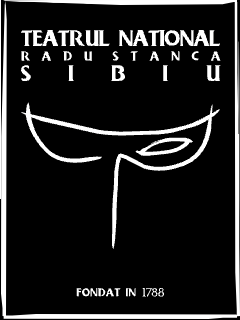Sibiu’s Theatre Tradition
The “Radu Stanca” National Theatre Sibiu is one of the longest-standing theatres in Romania and Europe. It has contributed to the founding of the Sibiu International Theatre Festival and boasts a rich history rooted in the 18th century, as well as a vast activity that marked the cultural and the economic and social life of the city of Sibiu, of Transylvania, of Romania, and even of Europe.
The Beginnings
Sibiu’s solid theatre life is connected to Martin Hochmeister Sr., an iconic figure of the German community, the founder of the first book shop in Transylvania and of the publication Theatral Wochenblatt für das Jahr 1778, the man who set up the first theatre building on the present-day territory of Romania. On 11 June 1787, Martin Hochmeister signed a contract with the magistrate of Sibiu thus granting him the land on which to build the first theatre, that he designed from his own funds in the building of the Thick Tower, one of the city’s defence towers. To repurpose the building, the medieval fortifications were modified based on the model of Viennese theatre.
Only one year later, on 1 June 1788, the Sibiu Theatre was inaugurated with the festive prologue “Thaliens Opferweihe” by the theatre’s director, Christof L. Seipp, and with the performance “Familia comică” by Johann Karl Wetzel. Until 1790, the city’s theatre life was managed by Seipp, who staged comedies, tragedies, operas and operettas, based on the season plan of the Viennese Hofburgtheater. A point of novelty in the town’s theatre history was the innovation brought on by the Sibiu Guild Association, which built a revolving stage, divided in such a way that four stage areas were available in the Big Square. Besides, a theatre curtain dating back to the 17th century is under storage in the Brukenthal Museum collections, as one of the most valuable and unique testimonies of the townsmen's early theatre inclinations.
In fact, Sibiu had a notable theatre life before the theatre building was built, as the citadel was often visited by travelling comedian groups ever since 1752, while Gertraut Bodenburgerin, also known as Mrs. Neuber of Transylvania came to the town in 1761 and stayed until 1766. The theatre performances took place in wooden kiosks, in the big hall above the butchers’ hall in the Small Square, or the Blue House in the Big Square, in a special wing built by Baron Lambert von Möringer.
A year after the inauguration of the theatre in the Thick Tower, now known as the Thalia Hall, Martin Hochmeister organized the first balls there as well as numerous theatre, music, and cultural events. The space hosted special cultural manifestations: in 1851, Viena’s Hofburg Theatre’s Ludwig Löwe held a representation, Johannes Brahms and Joseph Joachim held concerts in 1879, the first opera performance in Romanian took place here in 1886 under the baton of Gheorghe Dima, with soprano Maria Crişan, baritone Nicolae Popoviciu, and tenor Ghiţă Pop.
With certain interruptions, theatre performances were organized in the citadel until the theatre building was destroyed in a fire in 1826; it was quickly rebuilt by Martin Hochmeister Jr. Sibiu saw Transylvania’s first staging of “Faust”, directed by Emil Anthony around 1850, and it was around this time that the theatre, led by director Eduard Kreibig, turned from seasonal to stable, with a dedicated cast and a repertory made up of classic plays and high quality comedies. In 1865, the theatre, its garden and the adjacent buildings were bought by the town of Sibiu at a price of 35,000 guilders. Later on, the theatre season become permanent and the repertory was inspired from the Viennese theatre model.
An important point of Sibiu’s theatre life was the first tour of a Romanian-speaking theatre group, in 18-30 June 1868, at the present-day Thalia Hall, where the group of the great actor and director Mihail Pascaly held a series of theatre performances, with Mihai Eminescu, now the Romanian national poet, as prompter. Pascaly’s tour was followed by another one organized by actor Matei Millo in 1870, as Pascaly returned to Sibiu in 1871.
In 1893, Leo Bauer took over the German Theatre in Sibiu, as he was an actor with extensive experience on European stages, thus attracting numerous and diverse audiences.
Theatre in the 20th Century
The cultural life of Sibiu was constantly enriched thanks to the vibrant cultural-theatrical activity unfolded by the Transylvanian Association for Romanian Literature and the Culture of the Romanian People - ASTRA, which organized theatre events and literary evenings. A new, this time smaller, theatre stage was inaugurated in Sibiu on 22 August 1905 at the ASTRA Association Museum, with a representation of “Fântâna Blanduziei”, by Vasile Alecsandri, directed by Zaharia Bârsan, with Marioara Voiculescu, an actress of the Bucharest National Theatre.
Tours by groups from other towns in the province, as well as amateur theatres organized by cultural and even workmen's reunions, which approached by Romanian and European texts, constantly enriched Sibiu’s theatre life.
A remarkable contribution was brought on by Horia Petra-Petrescu (1884-1962), publicist, literary secretary and librarian of the ASTRA Society, who promoted the theatre movement among the Romanian population in Transylvania, as well as helped shape a valuable playwrighting repertory and encouraged the following of models that proved viable in the German space.
In 1921, ASTRA employed Nicolae Băilă as artistic director to develop a cultural propaganda through theatre and, in 1923, thanks to a funding from the Ministry of Religious Affairs and Arts, managed to organize the first permanent season in Romanian in Sibiu. The season was opened at the Sibiu town theatre on 3-4 November 1923 with the performance “Fântâna Blanduziei” and went on until the spring of 1924, a time interval in which the ASTRA Theatre Company held 28 performances of 10 plays, of which four original.
In 1919, Thalia Hall hosted a tour by the National Theatre in Bucharest with the great Constantin Nottara, on which occasion “Poemul Unirii” by Zaharia Bârsan and “Apus de soare” by Barbu Delavrancea were staged. In 1921, the building hosted a representation by the Great Russian Ballet and a tour by Constantin Tănase; then, in 1925, it hosted the theatre group led by Lucia Sturza Bulandra, while in 1930, the Academic Theatre of Vienna. In 1931, writer Liviu Rebreanu held a conference on the stage of the Sibiu theatre, followed by Mircea Eliade in 1938, while in 1942 the stage hosted a concert by George Enescu.
Starting 1919, the newly founded Sibiu Association for German Theatre (Hermannstädter Deutscher Theaterverein) looked after amateur and professional theatres. In 1922, in Sibiu, a notable association was established, which influenced the theatre life of the German community in Transylvania and Romania – the General Association for Transylvania’s German Theatre, with branches in numerous cities of the province. The Association aimed to promote German theatre, professional management for theatres, and the organization of theatre events and literary evenings. As long as the Association existed, i.e. until 1950, it was led by dr. Iulius Bieltz. In 1933, Sibiu saw its first local professional theatre group, led by Gustav Ongyert; they performed theatre, opera and operetta shows, and presented their repertory to the audiences of Sibiu, as well as on tours in Transylvania.
In the 40s, the ASTRA Association set up a department entitled Theatre Friends, whose aim was to promote Transylvanian drama, and which collaborated with the Luptă și Lumină Workers’ Theatre.
The cultural life of Sibiu was also animated by the “King Ferdinand I” University of Cluj, which had taken refuge in Sibiu. Thus, the group Prietenii Seminarului de Estetică (Friends of the Aesthetics’ Seminar), led by Liviu Rusu, held theatre performances since 1942, while in 1943, the University Gruparea dramatică universitară (University Drama Group) staged theatre plays under the guidance of scholar and playwright Victor Papilian.
Sibiu’s theatre life, both in Romanian, and in German, went through a difficult time in the years after the Second World War. A slight improvement was visible in 1945, when a group of amateurs including Dumitru Axente, an actor who coordinated the rich theatre activity of the Reunion of Romanian Workers in Sibiu, started holding performances in Sibiu, using the group name “Apărarea Patriotică” (Patriotic Defence). In 1944-1945, the Iași National Theatre took refuge in Sibiu, as the city enjoyed valuable representations by its artists, including Miluță Gheorghiu, holder of the title People’s Artist, who memorably interpreted Vasile Alecsandri's Chirița.
On 1 October 1946, the People’s Theatre was founded, as initiated by writer Mircea Alexiu, around a group of artists, approved by the competent minister; starting the 1947 season, this theatre staged plays of the Romanian and European dramaturgy. Nicolae Albani, Ileana Grecu, Constantin Th. Stănescu, Angela Păcuraru-Albani, and later Puiu Besoiu-Metaxa, Constantin Anatol and others collaborated with this theatre. In the same 1946, in Sibiu, the “Timotei Popovici” Music and Drama Conservatory was set up, approved by an order of the Ministry of Arts; it functioned for three years and contributed to the training of a new generation of young actors.
In 1948, the Ministry of Arts and Information ordered the setting up of a regional group for the Sibiu-based People’s Theatre, made up of a team which was to hold representations in the county of Sibiu and in neighbouring counties, subsidized by the state. The theatre was headed by actor Constantin Sincu, from Bucharest, as the team was joined by actor Vasile Brezeanu and actress Victoria Medeea, and actors and Conservatory students from Sibiu. The People’s Theatre in Bucharest was repealed at the end of 1948, but its departments around the country kept working and prepared for the next season, but were called state theatres at local level.
The first permanent season of the Sibiu Theatre opened on 17 September 1948 with the performance “Pe sub castanii din Praga” (“Under the Chestnut-trees of Prague”) by Konstantin Simonov, a three-act drama directed by Gabriel Negry and Ion Deloreanu, with a cast made up of Constantin Stănescu, Nicolae Dan, Mircea Mureșan, Vasile Brezeanu, Nicolae Albani, Victoria Medeea, Angela Păcuraru, Septimiu Sever, Mircea Hîndoreanu, Mircea Axente, Vasile Bojescu, Bobi Tiberiu.
In its first decade of activity, the Sibiu Theatre brought the local audience no less than 80 premieres, a diverse repertory, and a cast of young actors, who became renowned names of the Romanian stage.
Radu Stanca, poet, playwright, director
In Sibiu, on 31 May 1947, the collective of the Sibiu Theatre staged the play “Păcat de tine, Tony” by Puiu Maximilian, starring young Radu Stanca as Dorel Slăvescu. It was then that the man who has become the patron of the Sibiu Theatre joined the local theatre group.
Radu Stanca (1920-1962), acclaimed playwright, poet, essayist, director, and actor, graduated from the “King Ferdinand” School of Letters and Philosophy in Cluj, with a BA thesis on The Problem of Reading. Starting 1943, he was an assistant professor at the Philosophy Department headed by Lucian Blaga. He was a member of the Sibiu Literary Circle and editor of the magazine Curțile dorului. He won the Sburătorul Prize for his play “Dona Juana” and collaborated with numerous publications of the time, including Tribuna, Contemporanul, Viața românească.
On 13 February 1949, Sibiu saw the premiere of “Căsuța din câmpie” by Samuil Marshak, the first play directed by Radu Stanca alongside technical director Boby Tiberiu, scenographer Olga Muțiu, and actors Angela Păcuraru, Mircea Axente, Virginia Stoicescu, Sabina Mușatescu, Constantin Th. Stănescu, Mircea Hîndoreanu, Septimiu Sever, Nora Vasilescu, Anișoara Dornescu, Eugenia Dimitriu, Nicolae Albani, Vasile Bojescu. Radu Stanca’s works, whether his texts or his stagings, revolutionized theatre; an example to this end is his “A Lost Letter” directed in Sibiu as the first performance in black and white.
He worked as a director of the Sibiu Theatre until 1961, when he left for Cluj-Napoca, where he became the first director of the National Theatre.
Throughout his activity in Sibiu, Radu Stanca was an iconic director who staged numerous productions appreciated by the audience, developed and brought to life a well-oiled theatre group, thus becoming a trailblazer for the exceptional evolution in time of the Sibiu Theatre that now bears his name.
The Becoming of the National Theatre
The building of the municipal theatre was destroyed in a fire at the beginning of 1949, so the theatre moved into the building of the former Apollo Cinema in Unirii Square which was turned in a theatre hall; in 1954, the building was rebuilt and renamed Clubul Uzinelor Independența.
On 17 November 1956, the German Department of the Sibiu State Theatre was set up with an inaugural performance based on Bertolt Brecht’s “Mutter Courage und ihre Kinder”, on 27 November. In its first decades, the activity of the German Department was mainly due to Hanns Schuschnig, an appreciated director and actor who ensured that the theatre group held thousands of performances in Sibiu and outside the city, with a rich repertory and a well-established cast. After this vibrant period of activity, the German Department went on a downward trend during the 1990s, although the situation changed in the following period.
In the 1980s, one of the greatest Romanian directors, Iulian Vișa from Sibiu decisively influenced the evolution and the rise of the Sibiu Theatre by staging very valuable performances. This time coincided with a new generation of young actors coming to Sibiu, recent graduates of drama schools around Romania, some of whom left an important mark on the rise of the Sibiu Theatre: Constantin Chiriac, Virgil Flonda, and Șerban Ionescu.
During the communism period, the directors and actors of the Sibiu Theatre breached the state’s strong censorship and so their art became a form of resistance through culture. A relevant example in this sense is the performance based on Tennessee Williams’ “Camino Real” directed by Iulian Vișa, with Virgil Flonda as Kilroy, Șerban Ionescu as Gutman, and Constantin Chiriac as the governess, which needed 17 representations throughout more than 12 months and a real fight for the authorities to accept and allow it to be performed in front of the audience on 9 July 1982. In the same period, the Sibiu Theatre staged “Oedip salvat” by Radu Stanca, the best performance of 1980, “Răceala” by Marin Sorescu, with Radu Basarab and the young actors who had recently come to Sibiu, “D-ale carnavalului” by I. L. Caragiale, “Titanic Vals” by Tudor Muşatescu. In the ‘90s, Tudor Popescu, the director of the Sibiu Theatre, set up a department of the theatre in Vâlcea. Some names worth mentioning are Goange Marinescu who staged “The Zoo Story” by Edward Albee, and Aureliu Manea, who directed “Rosmersholm” by Henri Ibsen, with a scenography by Helmut Stürmer.
Around the 1989 Revolution, Silviu Purcărete was preparing a premiere in Sibiu, a co-production between the Sibiu State Theatre and the Vâlcea Theatre: “Noaptea marilor speranțe” (“The Night of Great Expectations”) a title that foreshadowed the events to come.
In 1991, Iulian Vișa, who had returned to Romania after his exile during the communist period, directed a wonderful performance based on Tadeusz Różewicz “Cartoteca”, performed as a national premiere in Sibiu. For the same 1991/1992 season, he also directed “Chang Eng” by Göran Tunström, with Virgil Flonda and Constantin Chiriac as the main characters.
The Rise to Fame
In 2000, the “Radu Stanca” Theatre entered a new stage. When Constantin Chiriac became the manager, the institution changed from the ground up and rose to national, European, and international fame. It shortly started collaborating with Silviu Purcărete, who staged his first performance in Sibiu, “Pilaffs and Mule Scent” in 2002. Similarly, Alexander Hausvater directed George Tabori’s “The Cannibals” in Sibiu in 2004, Andriy Zholdak directed Dostoevsky’s “The Idiot”, which enjoyed sounding success, while Mihai Măniuțiu directed “The Jewish Trilogy”, a series of valuable performances appreciated by audiences and critics in Romania and abroad to this very day.
In 2004, the “Radu Stanca” Theatre in Sibiu became a national theatre, the only one in Romania subordinated to the local authorities; ever since, it has been known as the “Radu Stanca” National Theatre Sibiu.
As a natural continuation of a theatre tradition that developed over several centuries, the “Radu Stanca” National Theatre Sibiu and its associated structures are now regional pillars of culture, education, and research. As a multifunctional structure whose activity aims to make strategic use of cultural resources as a premise for the community’s full development at a local, regional and national level, the Sibiu International Theatre Festival and the “Radu Stanca” National Theatre founded the Sibiu Performing Arts Market (1997), one of the most relevant platforms for creativity, dialogue, and mobility dedicated to performing arts professionals around the world, as well as the Volunteer Programme, and the Department of Drama and Theatre Studies (Drama, Theatre Studies - Cultural management, and Choreography) within the “Lucian Blaga” University of Sibiu (1997-2000). In the same way, in 2013, the Sibiu Walk of Fame was created, while in 2014, the Platform of Doctoral Research in the Fields of Performing Arts and Cultural Management.
Artistic quality, as well as the collaborations with renowned Romanian and foreign directors who have created shows on the Sibiu stage have led to a continuous growth of new performances and new actors. Nowadays, the theatre has a team of permanent artists who contribute to the staging of 120 shows, in both Romanian and German. Starting 2001, the “Radu Stanca” National Theatre has been on an impressive number of 520 tours in Romania and abroad; it was also invited to renowned festivals around the world, such as in Edinburgh, Avignon, New York, Brussels, Rome, Tokyo, Seoul, St. Petersburg, Moscow, Naples, Paris, Liverpool, London, Budapest, Bogota, Tampere, Poznan, Warsaw, Barcelona, Lisbon, Porto, Cairo, Yerevan, Tbilisi, Nitra, Athens, Thessaloniki, Belgrade, Varna, Lille, Tel Aviv, Omsk, and Chisinau.
All the activities taking place in our six performance venues, as well as in non-conventional spaces (factories, trams, on the street, and in parking lots), in educational institutions, partner companies, libraries, book shops, etc., are dedicated to high quality creations and to education through culture. With a broad repertory varying from Greek tragedies to innovative 21st-century experiments, the “Radu Stanca” National Theatre Sibiu has collaborated with important directors in Romania and abroad, such as: Silviu Purcărete, Andrei Șerban, Andriy Zholdak, Kushida Kazuyoshi, Armin Petras, Mihai Măniuțiu, Tompa Gábor, Alexandru Dabija, Yury Kordonsky, Radu Afrim, Alexander Riemenschneider, Radu Alexandru Nica, Robert Raponja, Masahiro Yasuda, Gigi Căciuleanu, Dragoș Galgoțiu, Zoltán Balázs.
The “Radu Stanca” National Theatre and the Sibiu International Theatre Festival played a significant role in securing the title of European Capital of Culture for the city of Sibiu in 2007.







